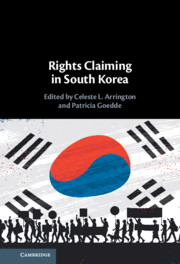Book contents
- Rights Claiming in South Korea
- Rights Claiming in South Korea
- Copyright page
- Dedication
- Contents
- Contributors
- Acknowledgments
- Abbreviations
- Introduction Rights in Action
- Part I Rights in Historical Perspective
- Part II Institutional Mechanisms for Rights Claiming
- Part III Mobilizing Rights for the Marginalized
- 9 From “We Are Not Machines, We Are Humans” to “We Are Workers, We Want to Work”
- 10 From Invisible Beneficiaries to Rights Bearers
- 11 The Politics of Postponement and Sexual Minority Rights in South Korea
- 12 Discovering Diversity
- Part IV Shaping Rights for New Citizens and Noncitizens
- Conclusion Findings and Future Directions
- Index
- References
11 - The Politics of Postponement and Sexual Minority Rights in South Korea
from Part III - Mobilizing Rights for the Marginalized
Published online by Cambridge University Press: 17 April 2021
- Rights Claiming in South Korea
- Rights Claiming in South Korea
- Copyright page
- Dedication
- Contents
- Contributors
- Acknowledgments
- Abbreviations
- Introduction Rights in Action
- Part I Rights in Historical Perspective
- Part II Institutional Mechanisms for Rights Claiming
- Part III Mobilizing Rights for the Marginalized
- 9 From “We Are Not Machines, We Are Humans” to “We Are Workers, We Want to Work”
- 10 From Invisible Beneficiaries to Rights Bearers
- 11 The Politics of Postponement and Sexual Minority Rights in South Korea
- 12 Discovering Diversity
- Part IV Shaping Rights for New Citizens and Noncitizens
- Conclusion Findings and Future Directions
- Index
- References
Summary
Despite some policy gains and expanded civil liberties, sexual minorities in South Korea face challenges from both conservatives and liberals. While anti-LGBTI conservatives seek to block equal rights and antidiscrimination laws, many liberal politicians have been reluctant to embrace sexual minority rights as fundamental human rights. In many instances, they portray sexual minority rights as premature, rather than permanently impossible, asserting that it is “not yet” the right time in Korea. This chapter discusses early LGBTI mobilization in the 1990s in three parts: the solidarity politics cultivated with labor and emerging human rights activism against state violence and national security surveillance; the untimely deaths of LGBTI activists; and so-called youth protection policies that deferred freedom and empowerment for LGBTI youth. This discussion is paired with an analysis of how LGBTI rights activism fared during and after the Candlelight Protests in 2016–17 in what I call a “politics of postponement.”
Keywords
- Type
- Chapter
- Information
- Rights Claiming in South Korea , pp. 236 - 252Publisher: Cambridge University PressPrint publication year: 2021

